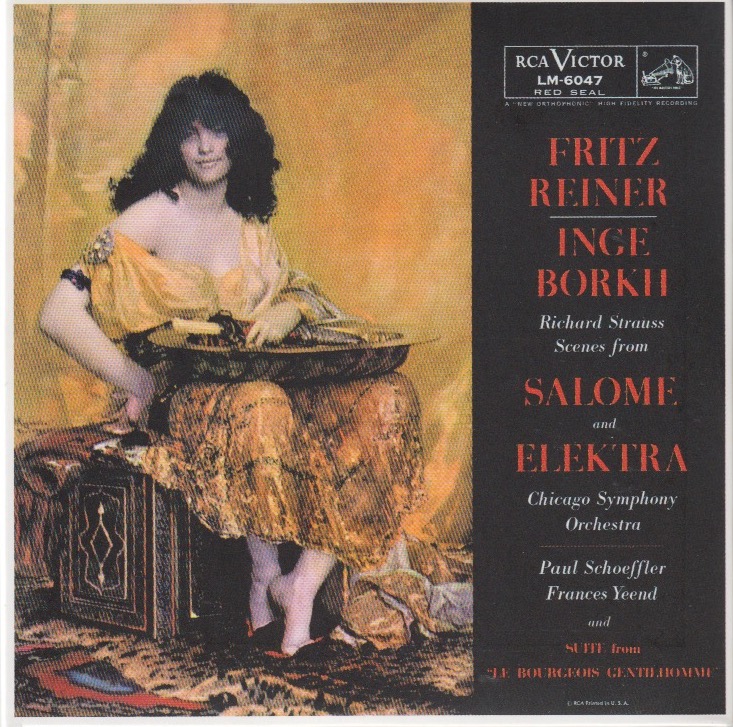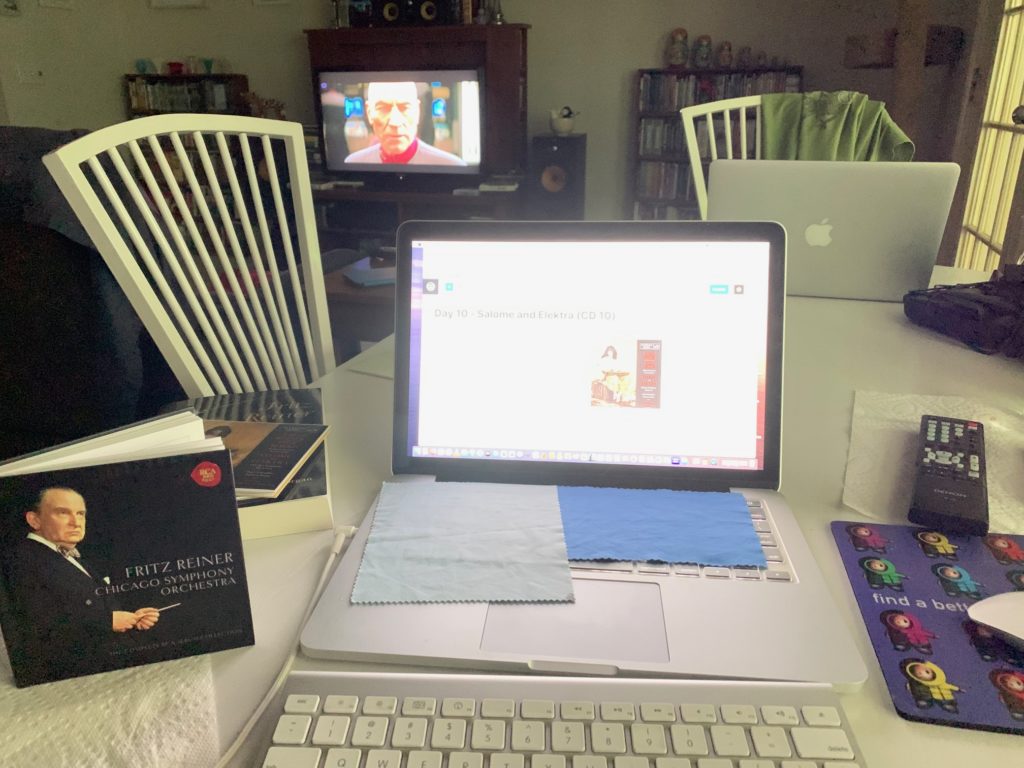
There’s a funny scene in the classic movie Raiders of the Lost Ark in which Indy has just run away from his arch nemesis Belloq and a tribe of bloodthirsty natives. Making his way through a dense jungle, he barely makes it to the sea plane waiting for him in the river. He grabs hold as the plane taxis away and climbs aboard, blow darts and arrows striking all around him.
The plane leaves the water with him in the passenger seat.
Ahh. Safe and sound.
Nope.
Indy looks down between his legs and notices what appears to be a large boa constrictor slithering toward him. He stiffens and screams, “There’s a big snake in the plane, Jock!”

Jock, the pilot, says nonchalantly, “Oh, that’s just my pet snake Reggie.”
Unassuaged, Indy replies, “I hate snakes, Jock! I hate ’em!”
Jock replies, “Come on. Show a little backbone, will ya?”
I felt like Indiana Jones when I pushed play on today’s CD – a double CD, no less. Only, my exclamation to Jock would have been,
“There’s an opera in my iTunes player, Jock!”
Jock, the pilot, would say nonchalantly, “Oh, that’s just Salome and Elektra.”
Unassuaged, I’d reply, “I hate opera, Jock! I hate it!”
And there you have how I approached today’s music.
Opera.
German opera, no less. By Richard Strauss. With one of those singers who sounds like an old-timey proper church lady. Or a female actor from the 1930s and ’40s.
Given what I’m hearing, I would have pegged Inge Borkh as a mezzo-soprano. But she’s listed as a soprano. Either way, she was very highly regarded, with even the NY Times noting her passing on August, 28, 2018, at the age of 97.
Borkh (1921-2018) was especially known for her portrayal of Salome in Richard Strauss’ Salome and Elektra.
So today’s recording, which features her in abundance, is historic.
I’ll grit my teeth and get through it.
But I’m not going to absorb both of these operas in one sitting. They’re on two CDs. So I’ll treat them as two separate days (which is good because, if I didn’t, I wouldn’t have 63 days with Fritz Reiner and Me). So, today, I’ll listen to just CD 10 – Salome and Elektra. Tomorrow, I’ll tackle another Richard Strauss opera, Der Burger als Edelmann, which is found on CD 11.
The Objective Stuff
This was recorded on two days in 1956: April 14 and 16. It featured the Chicago Lyric Theatre Chorus, which – according to its entry on Wikipedia –
…is one of the leading opera companies in the United States. It was founded in Chicago in 1954, under the name ‘Lyric Theatre of Chicago’ by Carol Fox, Nicola Rescigno and Lawrence Kelly, with a season that included Maria Callas’s American debut in Norma. The company was re-organized by Fox in 1956 under its present name and, after her 1981 departure, it has continued to be of one of the major opera companies in the United States. The Lyric is housed in a theater and related spaces in the Civic Opera Building. These spaces are now owned by the Lyric.
That’s quite a pedigree. Maria Callas? Now that’s a voice I wouldn’t mind hearing.
The opera (officially known as Elektra, according to its entry on Wikipedia),
…is a one-act opera by Richard Strauss, to a German-language libretto by Hugo von Hofmannsthal, which he adapted from his 1903 drama Elektra. The opera was the first of many collaborations between Strauss and Hofmannsthal. It was first performed at the Königliches Opernhaus in Dresden on 25 January 1909. It was dedicated to his friends Natalie and Willy Levin.
You know what that doesn’t tell me? When it was composed. Somewhere between 1903 and 1909, obviously. But when, exactly?
I googled the question and discovered it was composed in 1908 when Strauss was 44.
More about Elektra from Wikipedia:
While based on ancient Greek mythology and Sophocles’ tragedy Electra, the opera is highly modernist and expressionist in style. Hofmannsthal’s and Strauss’s adaptation of the story focuses tightly on Elektra, thoroughly developing her character by single-mindedly expressing her emotions and psychology as she meets with other characters, mostly one at a time. (The order of these conversations closely follows Sophocles’ play.) The other characters are Klytaemnestra, her mother and one of the murderers of her father Agamemnon; her sister, Chrysothemis; her brother, Orestes; and Klytaemnestra’s lover, Aegisthus.
Elektra is the second of Strauss’s two highly modernist operas (the other being Salome), characterized by cacophonous sections and atonal leitmotifs. These works contrast highly with his earliest operas and his later period. The reception of Elektra in German-speaking countries was mostly divided along traditionalist and modernist lines.
Musically, Elektra deploys dissonance, chromaticism and extremely fluid tonality in a way which recalls but moves beyond the same composer’s Salome of 1905, and thus Elektra represents Strauss’s furthest advances in modernism, from which he later retreated. The bitonal or extended Elektra chord is a well known dissonance from the opera while harmonic parallelism is also a prominent modernist technique.
To support the overwhelming emotional content of the opera, Strauss uses an immense orchestra of about 110—one of the largest in opera…
There you have it.
The Subjective Stuff
Recording quality: 4
Overall musicianship: 4
CD booklet notes: 2.5
CD “album cover” information: 0
How does this make me feel: 1
I found this to be extremely dissonant, and tonally fluid. So much so that it sounded like a bunch of vocal notes accompanied by melodramatic music that rose and fell in volume.
The album cover revealed nothing about this except for its title and key names on the front. The back is blank. I couldn’t tell from the album cover if this was stereo or mono, let alone anything about the players or where it was recorded.

The information in the CD book was nearly as scarce. If not for the Internet, I’d have nothing to go on regarding this piece of music.
It’s a good thing my work station today was in front of the TV. Star Trek’s Nemesis was playing in the background, not that I could hear it.
Even Nemesis – one of the worst of the Star Trek: The Next Generation movies – was more entertaining than Salome and Elektra.
The singers were good. I’ll give them that.
But, as a general rule, “I hate opera, Jock!”
